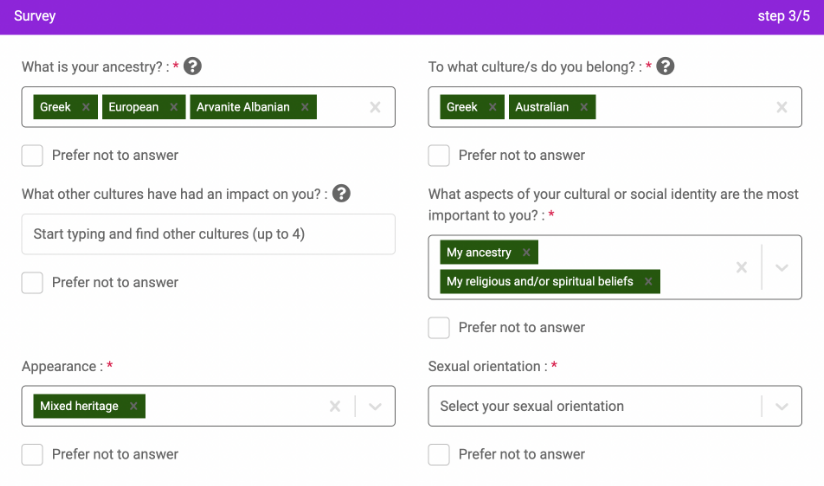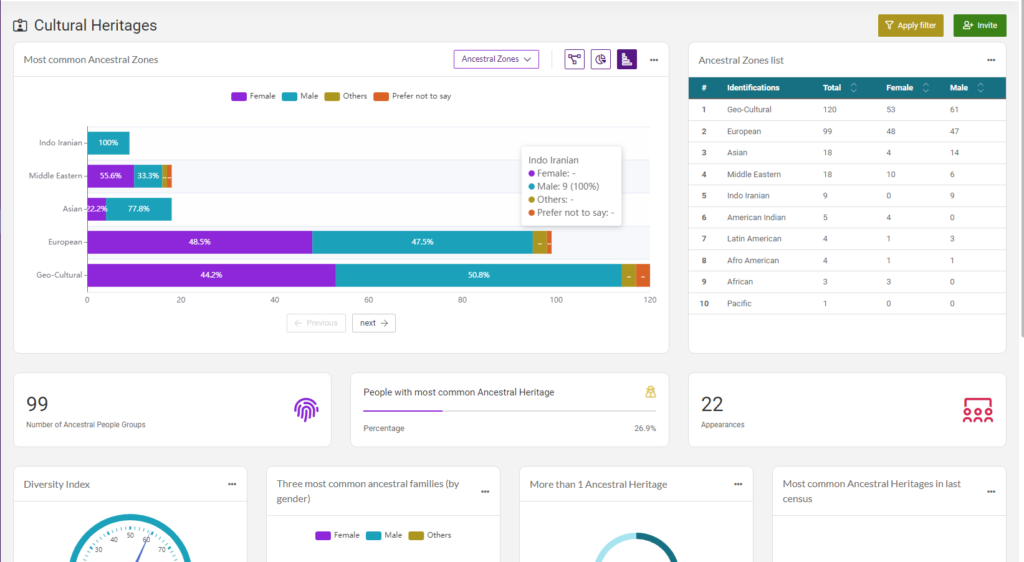
In this product update, Cultural Attaché Quincy Hall introduces the two new questions set to be added into the core Diversity Atlas Survey.
In mid-April, Cultural Infusion will be adding two new questions to the core Diversity Atlas survey, both of which are designed to bring even more nuanced understanding to your team’s cultural identities and sense of belonging.
It gives us enormous pride and pleasure to release these questions to our product and in this article, I’ll give you some background on our reasoning, and a quick tour of the questions themselves… and also give an answer to the great question: “So what?”
What aspects of your cultural or social identity are of most importance to you?
Our CTO Rezza Moieni recently published a peer-reviewed scientific paper that analysed research he undertook across three countries looking at the types of answers people gave to this question. What he found (among many other things) was:
In Pakistan, ‘religion / worldview’ was more important to one’s identity than one’s nationality, language family or ethnic background. Further, the older they got, the more likely that would be the case. In Australia, the above was not true at all. It was found that older Australians became more invested in their religion / worldview, but ethnicity, language and nationality was often more or at least of equal importance, especially at younger ages where religion/worldview were the least important aspect of cultural identity.
There were many more statistical insights to be found in Rezza’s most excellent paper, and it gave us food-for-thought as to what other aspects of one’s identity could be of importance to them, and thus, we have developed a list of 20 options (for now) including the four above but also gender, sexuality, age, politics, and others. Participants can select up to three.
So what?
The data will bring rich insights to our customers as to what is important to their teams. Maybe ‘gender’ or ‘religion’ are the most commonly selected options? If so, it will inform the DEI manager that gender and/or interfaith initiatives must be looked at more closely. Do you need prayer rooms? Is gender balance out of whack?
Further, do we see differences across countries or departments? Did the Japanese team select ‘Gender’ as the highest priority, but the Indian team select ‘Ethnicity’? Why in the Marketing team is ‘Politics’ so prevalent whilst in the IT department it barely rates a mention?
Knowledge of identity priorities will assist the DEI leaders in framing bespoke initiatives rather than taking a blanket approach across regions or departments. The formulation of diversity programs should never be done without first coming to an understanding as to what is at the forefront of people’s minds.
To what culture/s do you belong?
Technically this question is a split of an existing question. We previously asked: “What is you ancestry/culture?” and allowed the participant to select up to four. In the case of our CEO Peter Mousaferiadis, he would select ‘Greek’ and ‘Turkish’ as ancestry but also ‘Australian’ as his culture. But for many, they see a difference between their ancestral cultures and their current sense of cultural belonging. By giving the survey participant the ability to answer differently or the same across two questions allows for greater inclusivity and more nuanced data.
So now they will see two questions around their cultural identities.
“What is your ancestry?” and “To what culture/s do you belong?”
The answers to these questions will be fascinating from an anthropological point of view. Our dataset is the world’s largest commercially available repository of people groups (over 8500) and by allowing people to select up to eight people-groups across two questions will provide great inclusivity and world-first data. It’s a long way from the Australian census ’28 ethnicities – select ONE’ approach.
So what?
Where we come from is for many people just as important to them as who they are right now. Humanity has a history, a present and a future, and the story of homo sapiens wandering through the Anthropocene Epoch requires all three to make sense of things.
From an organisational and commercial point of view, it is acknowledged that people’s ‘culture’ lays at the heart of their sense of values, purpose, attitudes and even behaviors Clever fostering of the beautiful kaleidoscope of differences and similarities between cultures will lead to workplace harmony, productivity, and creativity and even profits. Understanding “Who we are” enables you to forge forward as an organisation, fully cognisant of the depth and potential of your people.

If you would like a one-on-one demonstration of Diversity Atlas, please contact me: [email protected]
Share this Post
